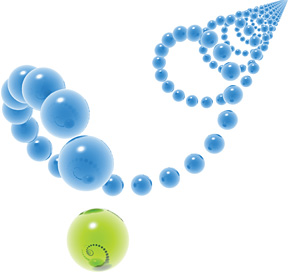Age 45: Coenzyme Q10 and Hawthorn
Coenzyme Q10 (CoQ10 ) is a vitamin-like substance found in every cell and is necessary to convert food into energy in aerobic metabolism (which generates 95 percent of the body's energy at rest and during light to moderate activity).
Studies show that our bodies can only make optimal amounts of CoQ
10 up to approximately age 20. After that, there is a decline in synthesis that starts to become significant by about age 40-45. Studies suggest that 30 mg of CoQ
10 supplementation per day is required as you reach the age of 45.
When our cells are unable to produce sufficient amounts of energy because of a CoQ10 deficiency state, a decline in cell function occurs that hastens the onset of accelerated aging, with an increased risk of congestive heart failure (weak heart pump), a decline in brain function, and/or a weakening of the immune system with associated increased cancer risk. More recently, we have seen that lack of CoQ10 production is a key underlying cause of Parkinson's disease, many cases of congestive heart failure and high blood pressure, and contributes to other common health problems known to be associated with aging.
To be effective, CoQ10 is best taken in a combination supplement that also contains the herb hawthorn. The active ingredients in hawthorn also enhance the ability of the heart to generate energy for its pumping action. In addition, hawthorn is known to open up (dilate) the coronary arteries, allowing more oxygen-rich blood to flow to the heart muscle itself. This is of vital importance in the prevention of heart attack and angina (chest pain/discomfort) once we are over the age of 40-45.
Age 50: Immune- and Detoxification-Support Nutrients
At age 50, the next genetic time bomb is set off that affects our immune and detoxification systems in an adverse way. This is unfortunate, as our immune and detoxification systems work hand in hand to protect us against cancer. Studies show that unless we become proactive, this protection declines with age, largely as a result of involution of the thymus gland.
As our immune system weakens and our liver enzymes become less able to clear cancer-causing agents and other impurities from our bloodstream, our risk of cancer has been shown to escalate. Additionally, a weakened immune system makes us more prone to serious, life-threatening infections. This is why older individuals often die from pneumonia, whereas younger people can fight off the infection and recover.
 Studies by Dr. Chandra at Memorial University in Newfoundland, Canada, and others provide evidence that older subjects given antioxidant supplements can boost their immune system back to more youthful functioning. However, other studies have shown that certain herbs and phytonutrients can significantly enhance immune and detoxification function to an even greater degree than vitamins and minerals alone. These stellar supplements include agents such as reishi mushroom extract, astragalus, indole-3-carbinol (from cruciferous vegetables) and milk thistle.
Studies by Dr. Chandra at Memorial University in Newfoundland, Canada, and others provide evidence that older subjects given antioxidant supplements can boost their immune system back to more youthful functioning. However, other studies have shown that certain herbs and phytonutrients can significantly enhance immune and detoxification function to an even greater degree than vitamins and minerals alone. These stellar supplements include agents such as reishi mushroom extract, astragalus, indole-3-carbinol (from cruciferous vegetables) and milk thistle.
After age 50, taking a combination supplement containing these four natural agents (in addition to a high-potency multiple vitamin and mineral) is an important aspect of anti-aging and disease prevention that cannot be overemphasized.
Age 50: Female Support Nutrients
At around age 50, women should consider another anti-aging supplement to help them through the menopausal and postmenopausal years. Women now live 30 percent of their lives in the postmenopausal years and the ingestion of natural female support nutrients can help preserve more youthful function and appearance, as well as address quality-of-life issues during this challenging stage of life.
Most women have heard the news that hormone replacement therapy increases risk of breast cancer, heart disease and stroke. As such, doctors are very cautious about recommending hormone replacement to women and are advised to prescribe the lowest possible dose for the shortest period of time, in cases where menopausal symptoms are severe. The new generation of bioidentical hormones may offer women an alternative treatment in this regard, but their long-term safety still requires confirmation from large clinical trials. As a natural alternative, women should know that certain herbs have been shown to safely manage menopausal symptoms, including hot flashes, insomnia, irritability, vaginal dryness, etc., in head-to-head clinical studies when tested against hormone replacement therapy.

